Report: Event Management Analysis of the Sochi Winter Olympics 2014
VerifiedAdded on 2020/02/19
|10
|1842
|53
Report
AI Summary
This report critically analyzes the event management failures of the 2014 Sochi Winter Olympics. It examines the event's lifecycle, including formation, growth, and staging, with a focus on tourism and hospitality management. The report highlights significant shortcomings in project management, particularly in risk assessment, leading to budget overruns, infrastructure issues, and time management failures. Corruption and inadequate planning are identified as key contributors to the event's shortcomings. The analysis reveals that the event failed in budgeting, quality, and timing, leading to numerous inconveniences for visitors and athletes. The report provides recommendations for future event management, emphasizing the importance of thorough risk analysis, quality control, and effective time management. The conclusion underscores the need for improved planning and execution to avoid similar failures in future large-scale events.
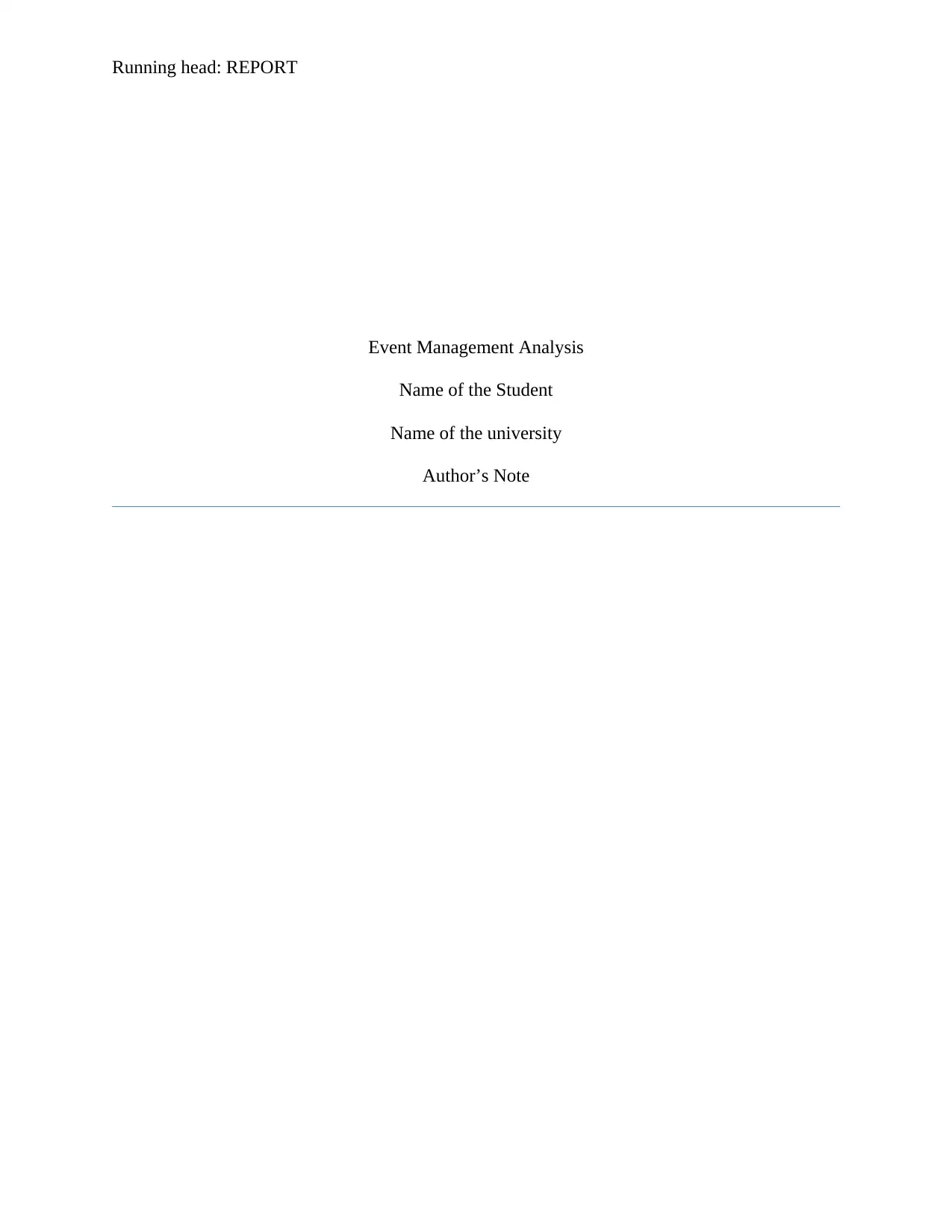
Running head: REPORT
Event Management Analysis
Name of the Student
Name of the university
Author’s Note
Event Management Analysis
Name of the Student
Name of the university
Author’s Note
Paraphrase This Document
Need a fresh take? Get an instant paraphrase of this document with our AI Paraphraser
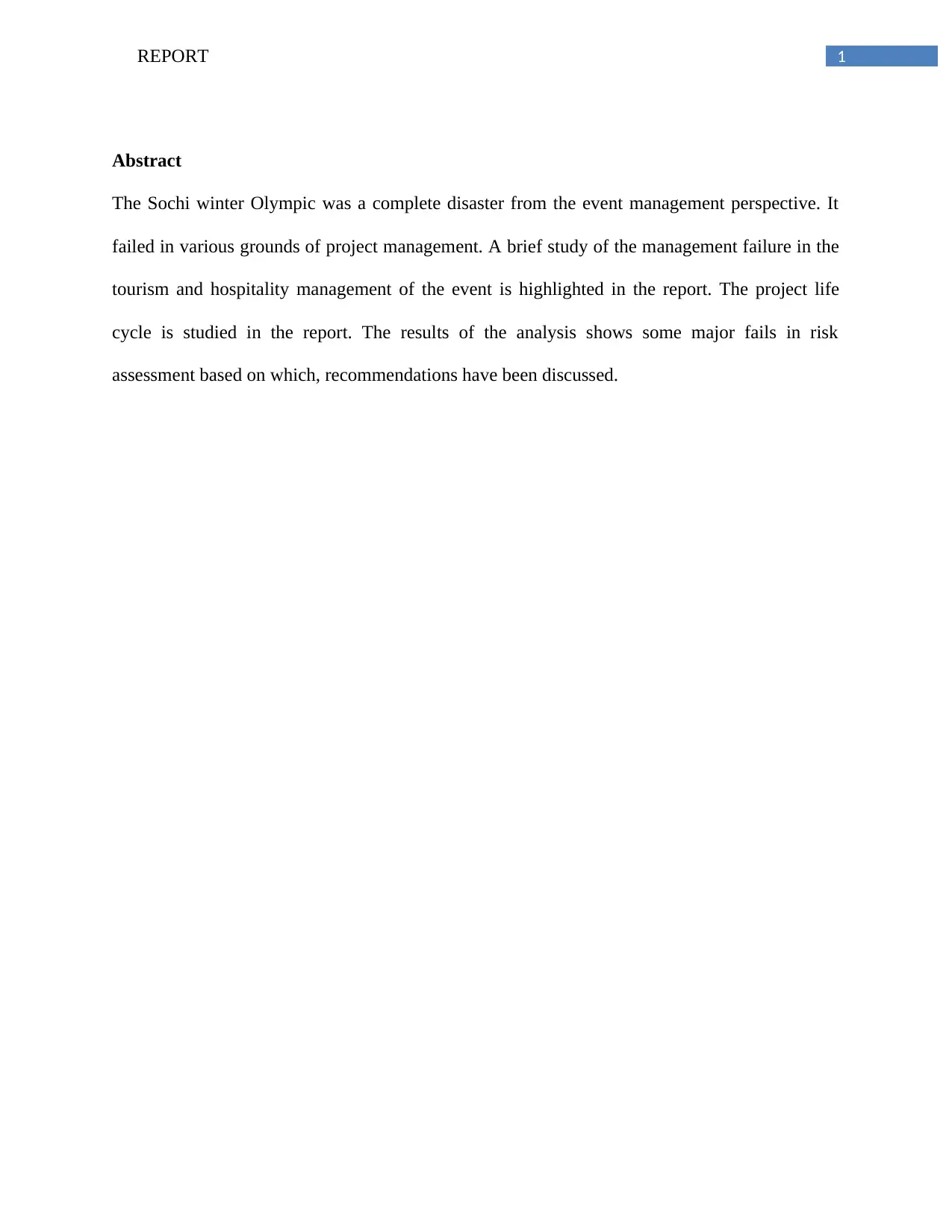
1REPORT
Abstract
The Sochi winter Olympic was a complete disaster from the event management perspective. It
failed in various grounds of project management. A brief study of the management failure in the
tourism and hospitality management of the event is highlighted in the report. The project life
cycle is studied in the report. The results of the analysis shows some major fails in risk
assessment based on which, recommendations have been discussed.
Abstract
The Sochi winter Olympic was a complete disaster from the event management perspective. It
failed in various grounds of project management. A brief study of the management failure in the
tourism and hospitality management of the event is highlighted in the report. The project life
cycle is studied in the report. The results of the analysis shows some major fails in risk
assessment based on which, recommendations have been discussed.
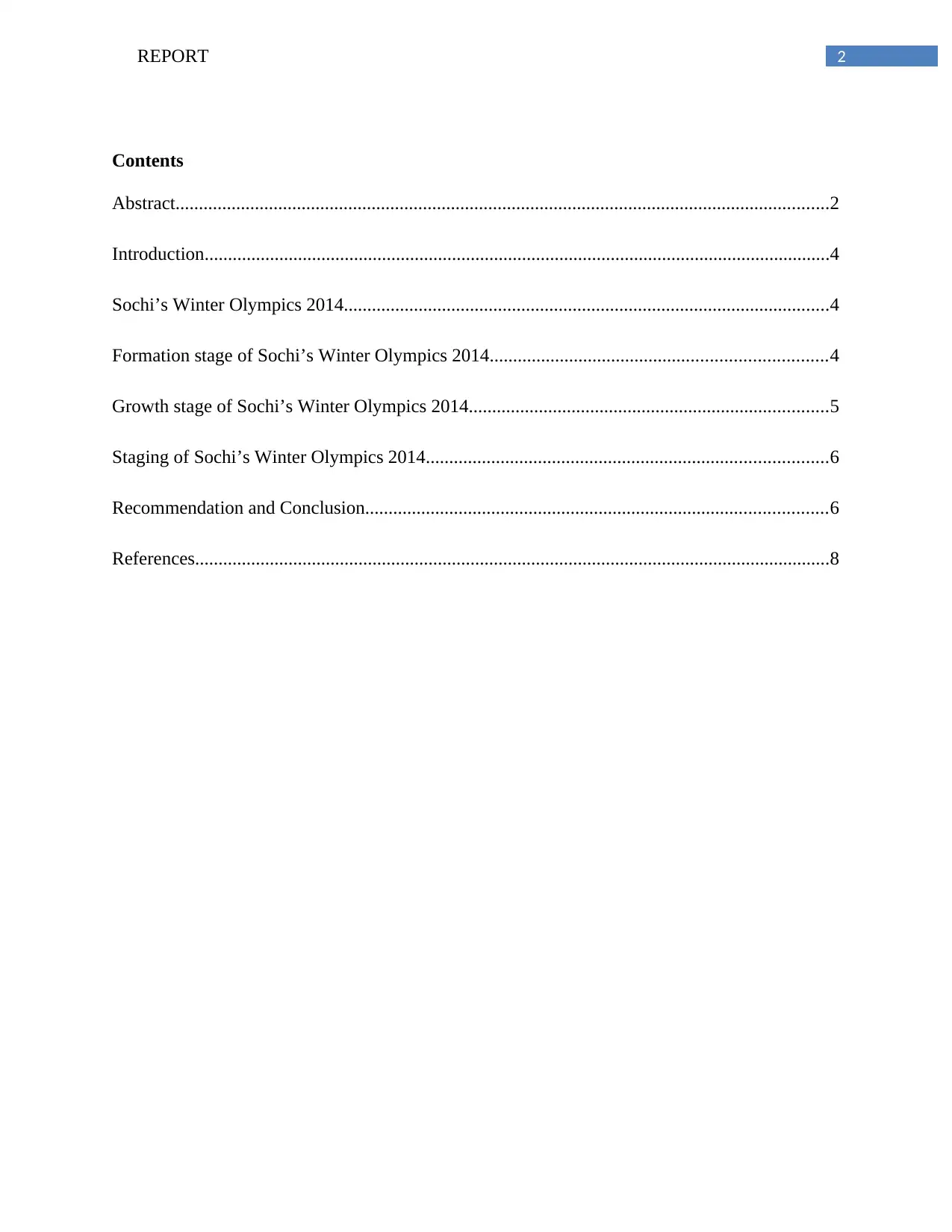
2REPORT
Contents
Abstract............................................................................................................................................2
Introduction......................................................................................................................................4
Sochi’s Winter Olympics 2014........................................................................................................4
Formation stage of Sochi’s Winter Olympics 2014........................................................................4
Growth stage of Sochi’s Winter Olympics 2014.............................................................................5
Staging of Sochi’s Winter Olympics 2014......................................................................................6
Recommendation and Conclusion...................................................................................................6
References........................................................................................................................................8
Contents
Abstract............................................................................................................................................2
Introduction......................................................................................................................................4
Sochi’s Winter Olympics 2014........................................................................................................4
Formation stage of Sochi’s Winter Olympics 2014........................................................................4
Growth stage of Sochi’s Winter Olympics 2014.............................................................................5
Staging of Sochi’s Winter Olympics 2014......................................................................................6
Recommendation and Conclusion...................................................................................................6
References........................................................................................................................................8
⊘ This is a preview!⊘
Do you want full access?
Subscribe today to unlock all pages.

Trusted by 1+ million students worldwide
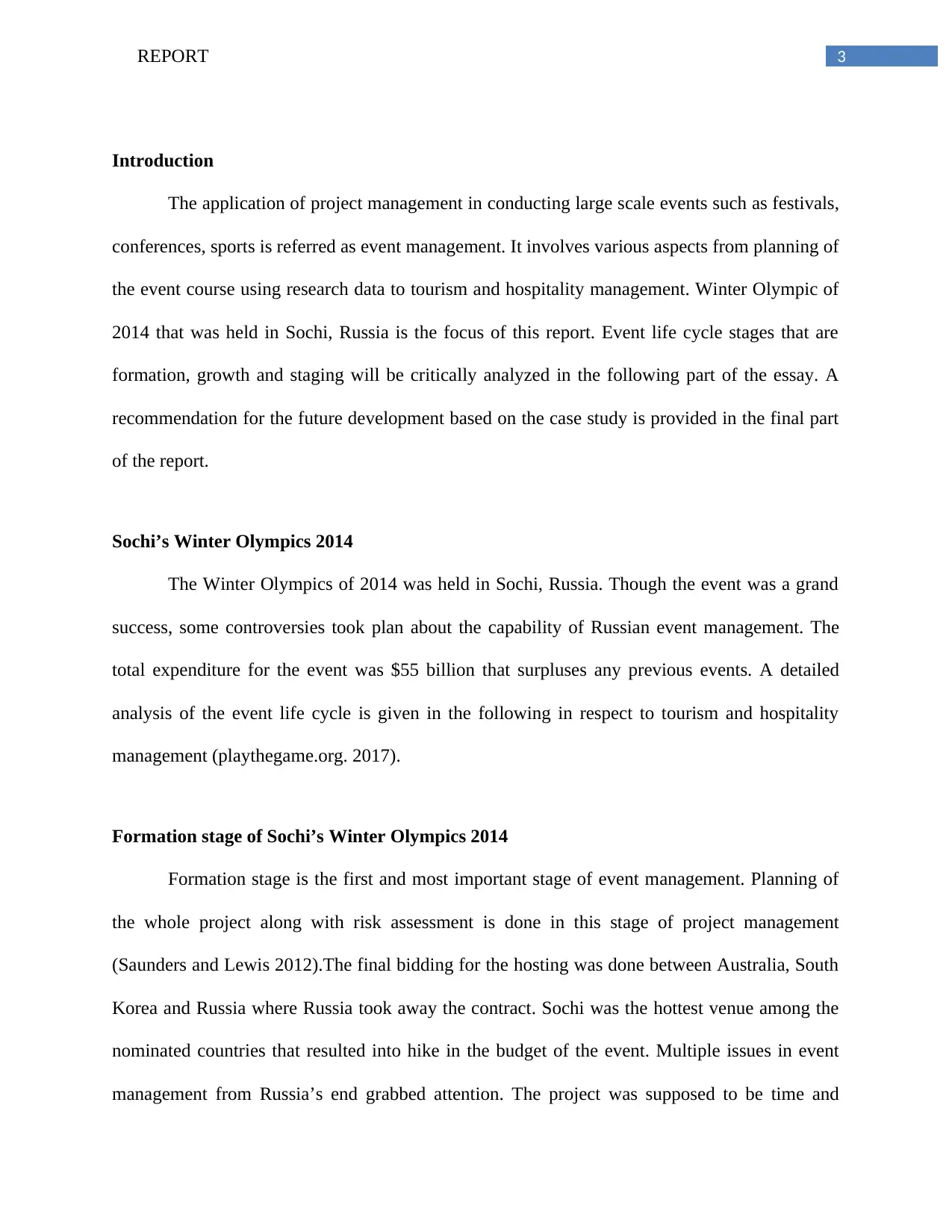
3REPORT
Introduction
The application of project management in conducting large scale events such as festivals,
conferences, sports is referred as event management. It involves various aspects from planning of
the event course using research data to tourism and hospitality management. Winter Olympic of
2014 that was held in Sochi, Russia is the focus of this report. Event life cycle stages that are
formation, growth and staging will be critically analyzed in the following part of the essay. A
recommendation for the future development based on the case study is provided in the final part
of the report.
Sochi’s Winter Olympics 2014
The Winter Olympics of 2014 was held in Sochi, Russia. Though the event was a grand
success, some controversies took plan about the capability of Russian event management. The
total expenditure for the event was $55 billion that surpluses any previous events. A detailed
analysis of the event life cycle is given in the following in respect to tourism and hospitality
management (playthegame.org. 2017).
Formation stage of Sochi’s Winter Olympics 2014
Formation stage is the first and most important stage of event management. Planning of
the whole project along with risk assessment is done in this stage of project management
(Saunders and Lewis 2012).The final bidding for the hosting was done between Australia, South
Korea and Russia where Russia took away the contract. Sochi was the hottest venue among the
nominated countries that resulted into hike in the budget of the event. Multiple issues in event
management from Russia’s end grabbed attention. The project was supposed to be time and
Introduction
The application of project management in conducting large scale events such as festivals,
conferences, sports is referred as event management. It involves various aspects from planning of
the event course using research data to tourism and hospitality management. Winter Olympic of
2014 that was held in Sochi, Russia is the focus of this report. Event life cycle stages that are
formation, growth and staging will be critically analyzed in the following part of the essay. A
recommendation for the future development based on the case study is provided in the final part
of the report.
Sochi’s Winter Olympics 2014
The Winter Olympics of 2014 was held in Sochi, Russia. Though the event was a grand
success, some controversies took plan about the capability of Russian event management. The
total expenditure for the event was $55 billion that surpluses any previous events. A detailed
analysis of the event life cycle is given in the following in respect to tourism and hospitality
management (playthegame.org. 2017).
Formation stage of Sochi’s Winter Olympics 2014
Formation stage is the first and most important stage of event management. Planning of
the whole project along with risk assessment is done in this stage of project management
(Saunders and Lewis 2012).The final bidding for the hosting was done between Australia, South
Korea and Russia where Russia took away the contract. Sochi was the hottest venue among the
nominated countries that resulted into hike in the budget of the event. Multiple issues in event
management from Russia’s end grabbed attention. The project was supposed to be time and
Paraphrase This Document
Need a fresh take? Get an instant paraphrase of this document with our AI Paraphraser
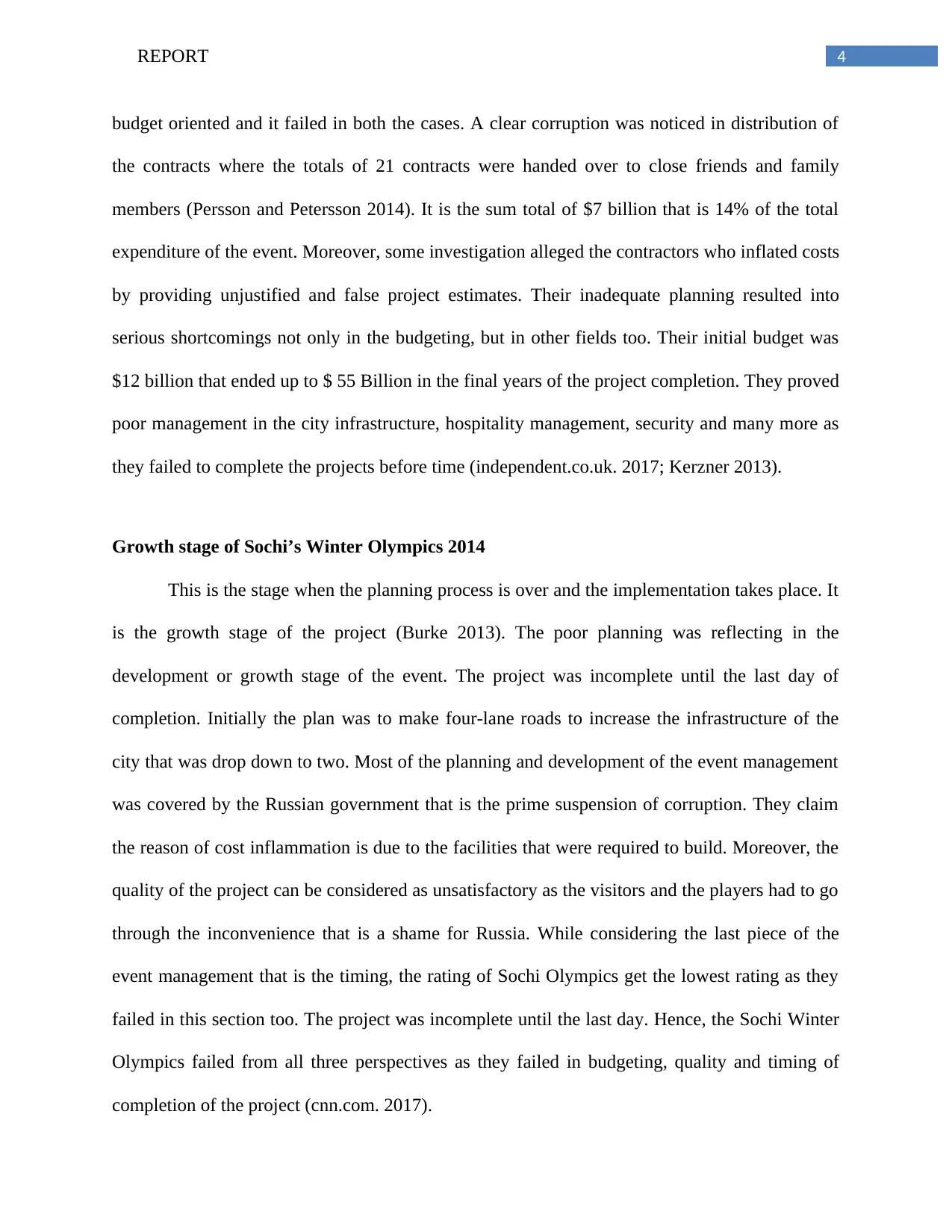
4REPORT
budget oriented and it failed in both the cases. A clear corruption was noticed in distribution of
the contracts where the totals of 21 contracts were handed over to close friends and family
members (Persson and Petersson 2014). It is the sum total of $7 billion that is 14% of the total
expenditure of the event. Moreover, some investigation alleged the contractors who inflated costs
by providing unjustified and false project estimates. Their inadequate planning resulted into
serious shortcomings not only in the budgeting, but in other fields too. Their initial budget was
$12 billion that ended up to $ 55 Billion in the final years of the project completion. They proved
poor management in the city infrastructure, hospitality management, security and many more as
they failed to complete the projects before time (independent.co.uk. 2017; Kerzner 2013).
Growth stage of Sochi’s Winter Olympics 2014
This is the stage when the planning process is over and the implementation takes place. It
is the growth stage of the project (Burke 2013). The poor planning was reflecting in the
development or growth stage of the event. The project was incomplete until the last day of
completion. Initially the plan was to make four-lane roads to increase the infrastructure of the
city that was drop down to two. Most of the planning and development of the event management
was covered by the Russian government that is the prime suspension of corruption. They claim
the reason of cost inflammation is due to the facilities that were required to build. Moreover, the
quality of the project can be considered as unsatisfactory as the visitors and the players had to go
through the inconvenience that is a shame for Russia. While considering the last piece of the
event management that is the timing, the rating of Sochi Olympics get the lowest rating as they
failed in this section too. The project was incomplete until the last day. Hence, the Sochi Winter
Olympics failed from all three perspectives as they failed in budgeting, quality and timing of
completion of the project (cnn.com. 2017).
budget oriented and it failed in both the cases. A clear corruption was noticed in distribution of
the contracts where the totals of 21 contracts were handed over to close friends and family
members (Persson and Petersson 2014). It is the sum total of $7 billion that is 14% of the total
expenditure of the event. Moreover, some investigation alleged the contractors who inflated costs
by providing unjustified and false project estimates. Their inadequate planning resulted into
serious shortcomings not only in the budgeting, but in other fields too. Their initial budget was
$12 billion that ended up to $ 55 Billion in the final years of the project completion. They proved
poor management in the city infrastructure, hospitality management, security and many more as
they failed to complete the projects before time (independent.co.uk. 2017; Kerzner 2013).
Growth stage of Sochi’s Winter Olympics 2014
This is the stage when the planning process is over and the implementation takes place. It
is the growth stage of the project (Burke 2013). The poor planning was reflecting in the
development or growth stage of the event. The project was incomplete until the last day of
completion. Initially the plan was to make four-lane roads to increase the infrastructure of the
city that was drop down to two. Most of the planning and development of the event management
was covered by the Russian government that is the prime suspension of corruption. They claim
the reason of cost inflammation is due to the facilities that were required to build. Moreover, the
quality of the project can be considered as unsatisfactory as the visitors and the players had to go
through the inconvenience that is a shame for Russia. While considering the last piece of the
event management that is the timing, the rating of Sochi Olympics get the lowest rating as they
failed in this section too. The project was incomplete until the last day. Hence, the Sochi Winter
Olympics failed from all three perspectives as they failed in budgeting, quality and timing of
completion of the project (cnn.com. 2017).
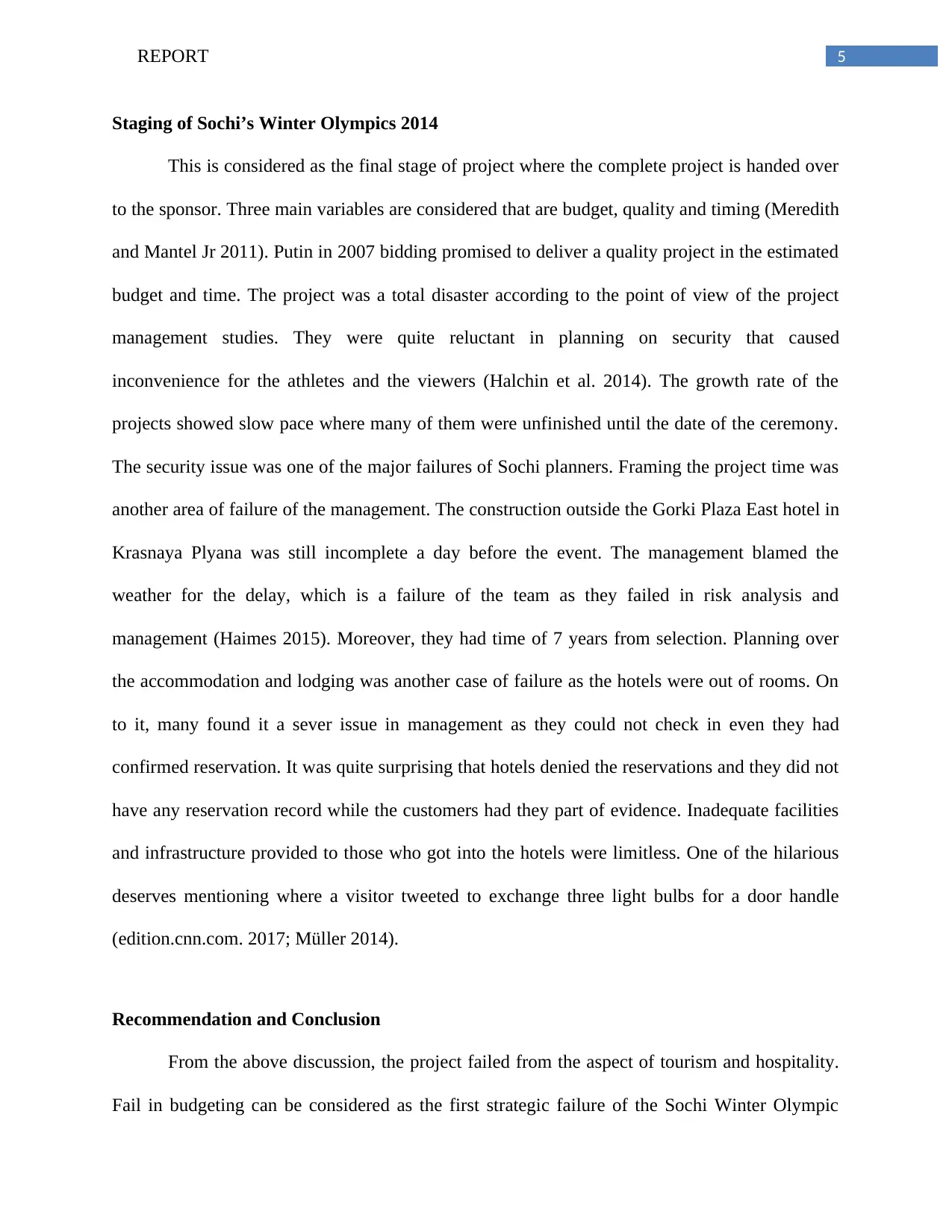
5REPORT
Staging of Sochi’s Winter Olympics 2014
This is considered as the final stage of project where the complete project is handed over
to the sponsor. Three main variables are considered that are budget, quality and timing (Meredith
and Mantel Jr 2011). Putin in 2007 bidding promised to deliver a quality project in the estimated
budget and time. The project was a total disaster according to the point of view of the project
management studies. They were quite reluctant in planning on security that caused
inconvenience for the athletes and the viewers (Halchin et al. 2014). The growth rate of the
projects showed slow pace where many of them were unfinished until the date of the ceremony.
The security issue was one of the major failures of Sochi planners. Framing the project time was
another area of failure of the management. The construction outside the Gorki Plaza East hotel in
Krasnaya Plyana was still incomplete a day before the event. The management blamed the
weather for the delay, which is a failure of the team as they failed in risk analysis and
management (Haimes 2015). Moreover, they had time of 7 years from selection. Planning over
the accommodation and lodging was another case of failure as the hotels were out of rooms. On
to it, many found it a sever issue in management as they could not check in even they had
confirmed reservation. It was quite surprising that hotels denied the reservations and they did not
have any reservation record while the customers had they part of evidence. Inadequate facilities
and infrastructure provided to those who got into the hotels were limitless. One of the hilarious
deserves mentioning where a visitor tweeted to exchange three light bulbs for a door handle
(edition.cnn.com. 2017; Müller 2014).
Recommendation and Conclusion
From the above discussion, the project failed from the aspect of tourism and hospitality.
Fail in budgeting can be considered as the first strategic failure of the Sochi Winter Olympic
Staging of Sochi’s Winter Olympics 2014
This is considered as the final stage of project where the complete project is handed over
to the sponsor. Three main variables are considered that are budget, quality and timing (Meredith
and Mantel Jr 2011). Putin in 2007 bidding promised to deliver a quality project in the estimated
budget and time. The project was a total disaster according to the point of view of the project
management studies. They were quite reluctant in planning on security that caused
inconvenience for the athletes and the viewers (Halchin et al. 2014). The growth rate of the
projects showed slow pace where many of them were unfinished until the date of the ceremony.
The security issue was one of the major failures of Sochi planners. Framing the project time was
another area of failure of the management. The construction outside the Gorki Plaza East hotel in
Krasnaya Plyana was still incomplete a day before the event. The management blamed the
weather for the delay, which is a failure of the team as they failed in risk analysis and
management (Haimes 2015). Moreover, they had time of 7 years from selection. Planning over
the accommodation and lodging was another case of failure as the hotels were out of rooms. On
to it, many found it a sever issue in management as they could not check in even they had
confirmed reservation. It was quite surprising that hotels denied the reservations and they did not
have any reservation record while the customers had they part of evidence. Inadequate facilities
and infrastructure provided to those who got into the hotels were limitless. One of the hilarious
deserves mentioning where a visitor tweeted to exchange three light bulbs for a door handle
(edition.cnn.com. 2017; Müller 2014).
Recommendation and Conclusion
From the above discussion, the project failed from the aspect of tourism and hospitality.
Fail in budgeting can be considered as the first strategic failure of the Sochi Winter Olympic
⊘ This is a preview!⊘
Do you want full access?
Subscribe today to unlock all pages.

Trusted by 1+ million students worldwide
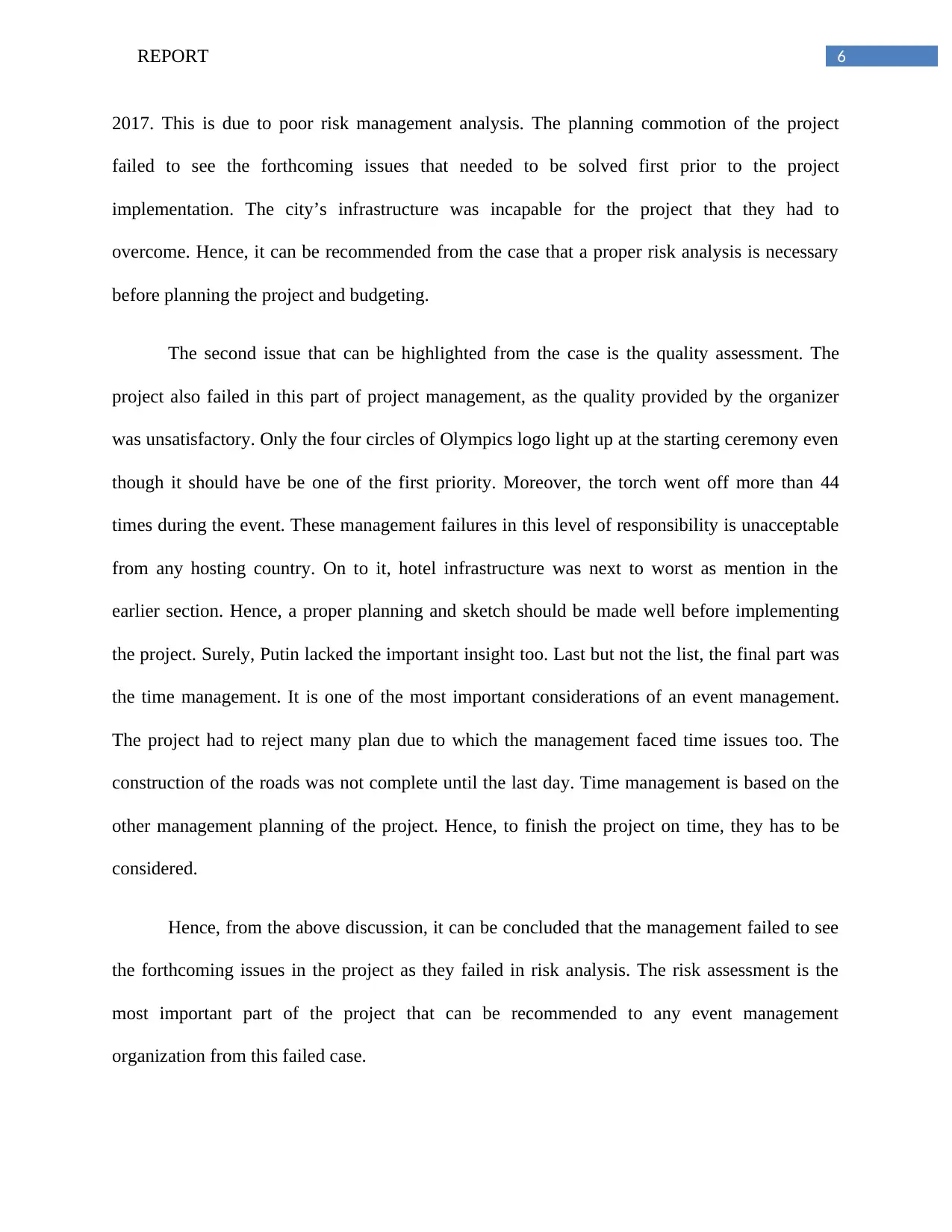
6REPORT
2017. This is due to poor risk management analysis. The planning commotion of the project
failed to see the forthcoming issues that needed to be solved first prior to the project
implementation. The city’s infrastructure was incapable for the project that they had to
overcome. Hence, it can be recommended from the case that a proper risk analysis is necessary
before planning the project and budgeting.
The second issue that can be highlighted from the case is the quality assessment. The
project also failed in this part of project management, as the quality provided by the organizer
was unsatisfactory. Only the four circles of Olympics logo light up at the starting ceremony even
though it should have be one of the first priority. Moreover, the torch went off more than 44
times during the event. These management failures in this level of responsibility is unacceptable
from any hosting country. On to it, hotel infrastructure was next to worst as mention in the
earlier section. Hence, a proper planning and sketch should be made well before implementing
the project. Surely, Putin lacked the important insight too. Last but not the list, the final part was
the time management. It is one of the most important considerations of an event management.
The project had to reject many plan due to which the management faced time issues too. The
construction of the roads was not complete until the last day. Time management is based on the
other management planning of the project. Hence, to finish the project on time, they has to be
considered.
Hence, from the above discussion, it can be concluded that the management failed to see
the forthcoming issues in the project as they failed in risk analysis. The risk assessment is the
most important part of the project that can be recommended to any event management
organization from this failed case.
2017. This is due to poor risk management analysis. The planning commotion of the project
failed to see the forthcoming issues that needed to be solved first prior to the project
implementation. The city’s infrastructure was incapable for the project that they had to
overcome. Hence, it can be recommended from the case that a proper risk analysis is necessary
before planning the project and budgeting.
The second issue that can be highlighted from the case is the quality assessment. The
project also failed in this part of project management, as the quality provided by the organizer
was unsatisfactory. Only the four circles of Olympics logo light up at the starting ceremony even
though it should have be one of the first priority. Moreover, the torch went off more than 44
times during the event. These management failures in this level of responsibility is unacceptable
from any hosting country. On to it, hotel infrastructure was next to worst as mention in the
earlier section. Hence, a proper planning and sketch should be made well before implementing
the project. Surely, Putin lacked the important insight too. Last but not the list, the final part was
the time management. It is one of the most important considerations of an event management.
The project had to reject many plan due to which the management faced time issues too. The
construction of the roads was not complete until the last day. Time management is based on the
other management planning of the project. Hence, to finish the project on time, they has to be
considered.
Hence, from the above discussion, it can be concluded that the management failed to see
the forthcoming issues in the project as they failed in risk analysis. The risk assessment is the
most important part of the project that can be recommended to any event management
organization from this failed case.
Paraphrase This Document
Need a fresh take? Get an instant paraphrase of this document with our AI Paraphraser

7REPORT
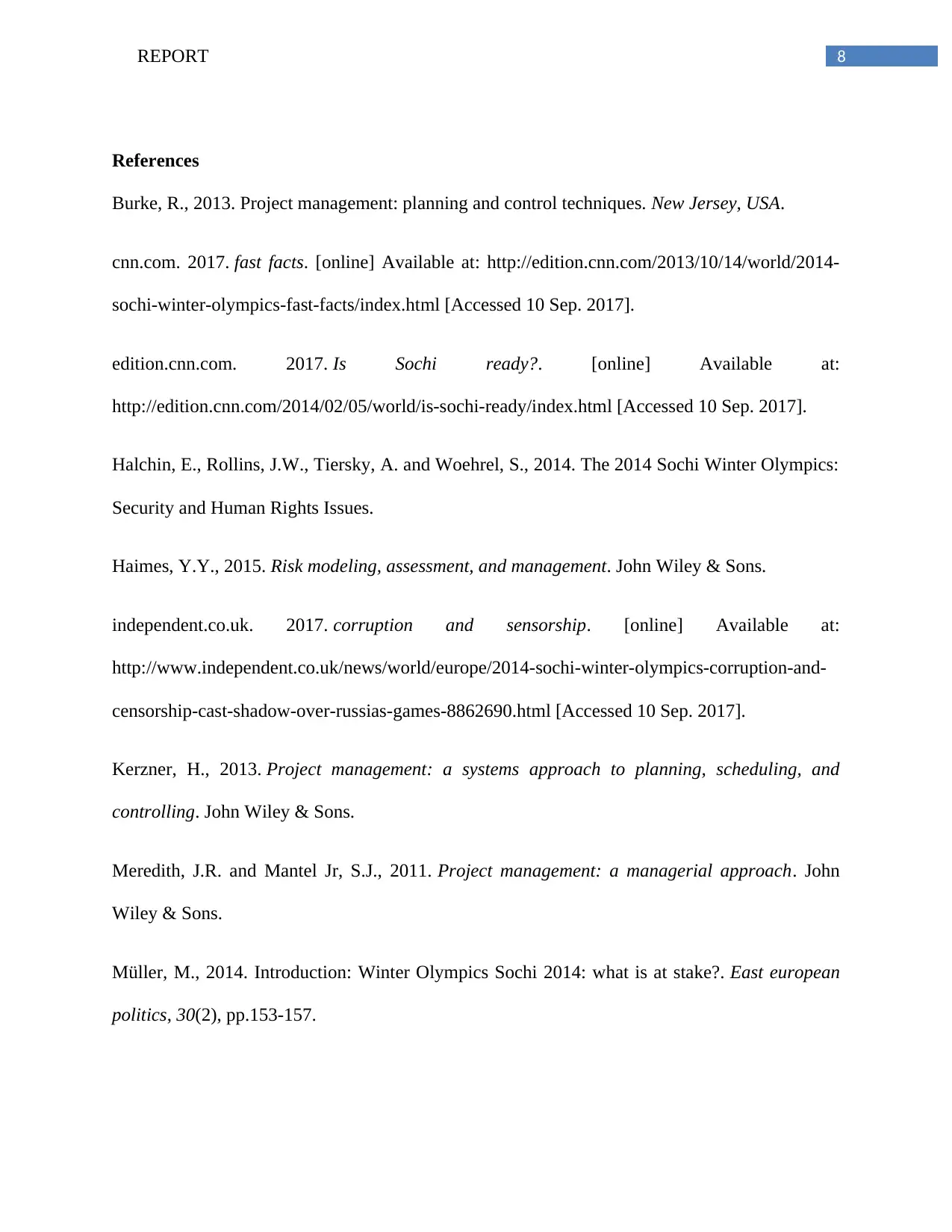
8REPORT
References
Burke, R., 2013. Project management: planning and control techniques. New Jersey, USA.
cnn.com. 2017. fast facts. [online] Available at: http://edition.cnn.com/2013/10/14/world/2014-
sochi-winter-olympics-fast-facts/index.html [Accessed 10 Sep. 2017].
edition.cnn.com. 2017. Is Sochi ready?. [online] Available at:
http://edition.cnn.com/2014/02/05/world/is-sochi-ready/index.html [Accessed 10 Sep. 2017].
Halchin, E., Rollins, J.W., Tiersky, A. and Woehrel, S., 2014. The 2014 Sochi Winter Olympics:
Security and Human Rights Issues.
Haimes, Y.Y., 2015. Risk modeling, assessment, and management. John Wiley & Sons.
independent.co.uk. 2017. corruption and sensorship. [online] Available at:
http://www.independent.co.uk/news/world/europe/2014-sochi-winter-olympics-corruption-and-
censorship-cast-shadow-over-russias-games-8862690.html [Accessed 10 Sep. 2017].
Kerzner, H., 2013. Project management: a systems approach to planning, scheduling, and
controlling. John Wiley & Sons.
Meredith, J.R. and Mantel Jr, S.J., 2011. Project management: a managerial approach. John
Wiley & Sons.
Müller, M., 2014. Introduction: Winter Olympics Sochi 2014: what is at stake?. East european
politics, 30(2), pp.153-157.
References
Burke, R., 2013. Project management: planning and control techniques. New Jersey, USA.
cnn.com. 2017. fast facts. [online] Available at: http://edition.cnn.com/2013/10/14/world/2014-
sochi-winter-olympics-fast-facts/index.html [Accessed 10 Sep. 2017].
edition.cnn.com. 2017. Is Sochi ready?. [online] Available at:
http://edition.cnn.com/2014/02/05/world/is-sochi-ready/index.html [Accessed 10 Sep. 2017].
Halchin, E., Rollins, J.W., Tiersky, A. and Woehrel, S., 2014. The 2014 Sochi Winter Olympics:
Security and Human Rights Issues.
Haimes, Y.Y., 2015. Risk modeling, assessment, and management. John Wiley & Sons.
independent.co.uk. 2017. corruption and sensorship. [online] Available at:
http://www.independent.co.uk/news/world/europe/2014-sochi-winter-olympics-corruption-and-
censorship-cast-shadow-over-russias-games-8862690.html [Accessed 10 Sep. 2017].
Kerzner, H., 2013. Project management: a systems approach to planning, scheduling, and
controlling. John Wiley & Sons.
Meredith, J.R. and Mantel Jr, S.J., 2011. Project management: a managerial approach. John
Wiley & Sons.
Müller, M., 2014. Introduction: Winter Olympics Sochi 2014: what is at stake?. East european
politics, 30(2), pp.153-157.
⊘ This is a preview!⊘
Do you want full access?
Subscribe today to unlock all pages.

Trusted by 1+ million students worldwide
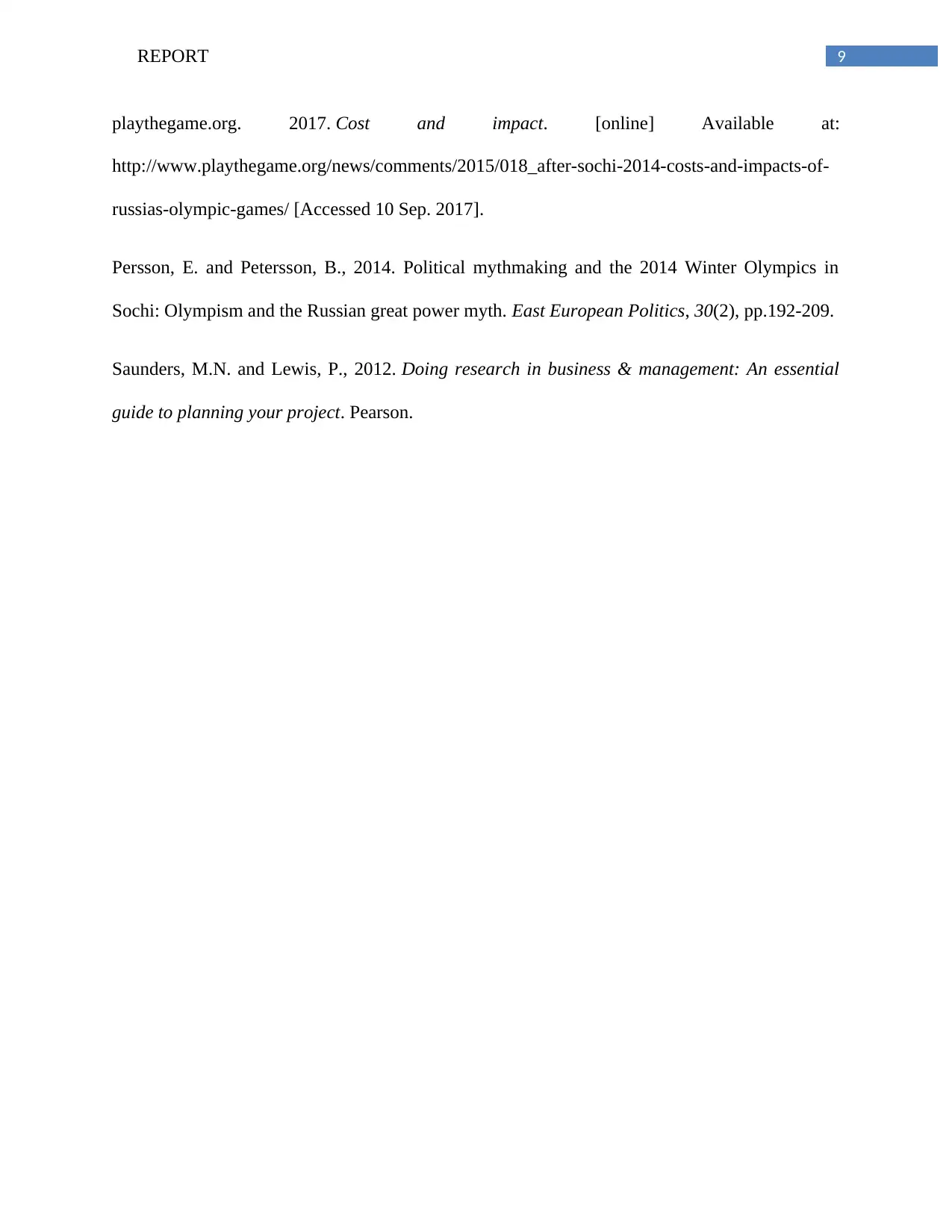
9REPORT
playthegame.org. 2017. Cost and impact. [online] Available at:
http://www.playthegame.org/news/comments/2015/018_after-sochi-2014-costs-and-impacts-of-
russias-olympic-games/ [Accessed 10 Sep. 2017].
Persson, E. and Petersson, B., 2014. Political mythmaking and the 2014 Winter Olympics in
Sochi: Olympism and the Russian great power myth. East European Politics, 30(2), pp.192-209.
Saunders, M.N. and Lewis, P., 2012. Doing research in business & management: An essential
guide to planning your project. Pearson.
playthegame.org. 2017. Cost and impact. [online] Available at:
http://www.playthegame.org/news/comments/2015/018_after-sochi-2014-costs-and-impacts-of-
russias-olympic-games/ [Accessed 10 Sep. 2017].
Persson, E. and Petersson, B., 2014. Political mythmaking and the 2014 Winter Olympics in
Sochi: Olympism and the Russian great power myth. East European Politics, 30(2), pp.192-209.
Saunders, M.N. and Lewis, P., 2012. Doing research in business & management: An essential
guide to planning your project. Pearson.
1 out of 10
Related Documents
Your All-in-One AI-Powered Toolkit for Academic Success.
+13062052269
info@desklib.com
Available 24*7 on WhatsApp / Email
![[object Object]](/_next/static/media/star-bottom.7253800d.svg)
Unlock your academic potential
Copyright © 2020–2026 A2Z Services. All Rights Reserved. Developed and managed by ZUCOL.





